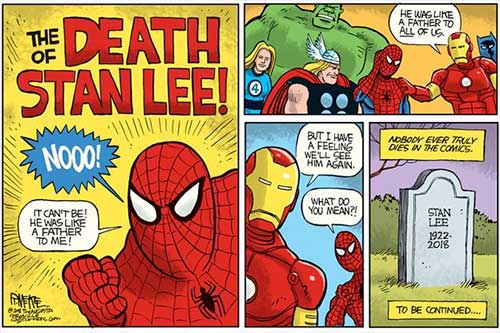Spending My Childhood With Stan Lee
By JOHN L. MICEK
November 13, 2018
Tuesday PM
(SitNews) -On Sunday afternoons in the late 1970s and early 1980s, long after 11 a.m. mass had finished, my cousin and I would head down the street to a little convenience store, hard against the Berlin Turnpike, that sold milk, bread, snacks, sundries, and, most important of all - comic books.
We'd let ourselves in, the bell hanging on top of the door jingling, the traffic still echoing in our ears in the brisk snap of a New England fall, and head for the spinning rack where four-color heroes on newsprint pulled us in with gravitational force.
Our prizes collected, we'd pay, and head back for an afternoon of heavy reading, passing the books between us until the sun hung low in the sky and our parents were beckoning from the front door, the cars warming in the driveway.
I'd read the Marvel titles and pretend I liked them. In truth, it was mostly to humor my cousin. I was a DC kid through and through.
Then one Saturday afternoon, I discovered a copy of a paperback collection called "Origins of Marvel Comics." It was pretty much what it sounded like: An omnibus reprint of the origin stories of "The Fantastic Four," "The Hulk," "Spider-Man," "Thor," and the mysterious "Dr. Strange."
I finally understood the human-level dramas of the dysfunctional "Fantastic Four." The dangers of the nuclear age, and the Cold War, then still very real, were driven home in the tragedy of "The Hulk." Thor's pseudo-Chaucerian dialogue was preposterous, but I loved it anyway. The ostracization "The X-Men" endured was a metaphor for every repressed minority, a reminder of how easy it is to hate and fear someone or something you don't understand.
A New York kid with outsized ambitions, Lee (born Stanley Liber) figured his work in comics would be a way station on the way to literary greatness. It didn't happen, but something even more profound did.
Lee became an assistant at Timely Comics in 1939, which would later evolve into Marvel Comics. After a decade or so of post-World War II artistic stagnation, Lee helped spark what's become known as "The Silver Age" of comics in the early 1960s. Lee rose to become Marvel's editor-in-chief.

Stan Lee 1922-2018
By Rick McKee ©2018, The Augusta Chronicle, GA
|
While he was a visionary, Lee was hardly perfect - as a unsparing 2016 profile in New York Magazine made painfully clear.
He had a nasty habit of hogging credit for his heroes. His gift for unrelenting self-promotion meant that the real talent behind the books - the great Jack "King" Kirby, Steve Ditko (who died in June at age 90) and the surrealistically stylish Jim Steranko - were unjustly overshadowed and robbed of the credit they so richly deserved.
"Stan Lee and I never collaborated on anything," Kirby told an interviewer in 1989, according to that 2016 New York Magazine profile. "It wasn't possible for a man like Stan Lee to come up with new things - or old things, for that matter. Stan Lee wasn't a guy that read or that told stories."
But Lee, as the face of Marvel, helped keep the company afloat through fallow times. And his high-stepping style drew in generations of fans. He penned a florid monthly column in those 1970s comics, signing off with a jaunty "Excelsior!" at the end of each piece.
And even though he didn't own the rights to his creations, Lee parted from Marvel in the early 1990s with a severance package so immense that the child of The Great Depression never had to worry about money ever again.
At the end of his life, Lee battled failing health and allegations that he was the subject of elder abuse, which played out in a Los Angeles courtroom over the course of this summer.
Even so, that didn't keep him from hitting the convention circuit. Lee's 2018 schedule included Silicon Valley Comic Con. At that convention, his health had deteriorated to the point where he was struggling to sign his name. He announced his exit from the convention circuit in August.
Maybe it's true that Lee didn't exactly tell stories. It's more accurate to say that he provided the architecture for greater writing talents to tell those stories, and for gifted artists to make them leap off the page.
But it's also true that Lee did something of equal, or, perhaps greater importance: His pride in those creations and his unrelenting promotion of them, now means that garishly costumed heroes, whose adventures are disposable by their very nature, have survived, and have been passed down to new generations of readers.
Yes, I know, those heroes are now multi-billion dollar properties that effectively print money for their Hollywood overlords. But that won't keep me from getting more than a tad nostalgic about it.
After all, myths and legends fade from memory if there's no one around to repeat them. And Lee, who helped give breath to our latter-day myths and legends, did that almost better than anyone.
So, one last time, "Excelsior!"
© Copyright 2018 John L. Micek,
distributed to subscribers by Cagle Cartoons newspaper syndicate.
This column has been edited by the author. Representations of fact and opinions are solely those of the author.
An award-winning political journalist, Micek is the Opinion Editor and Political Columnist for PennLive/The Patriot-News in Harrisburg, Pa.
Readers may follow him on Twitter @ByJohnLMicek and email him at jmicek@pennlive.com |


